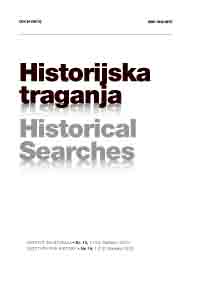CRKVA BOSANSKA U OČIMA DUBROVAČKIH SAVREMENIKA
THE BOSNIAN CHURCH IN THE EYES OF RAGUSAN CONTEMPORARIES
Author(s): Sejfudin IsakovićSubject(s): History, Cultural history, Diplomatic history, Local History / Microhistory, Middle Ages
Published by: Institut za istoriju
Keywords: Bosnian Church; medieval Bosnia; Ragusa; Christians; Patarenes; Bosnian nobility; Pavlović family; Kosača family; diplomatic service
Summary/Abstract: The activities of Bosnian Church members are important for the understanding of their place and role in Bosnian society as well as their position in the eyes of Ragusan cotemporaries. The character of Ragusan reports is specific and offers only certain types of information that refer to the secular activities of Bosnian Christians (krstjani). It is always emphasized in the documents that it is about Patarenes or Bosnian Christians. There is no difference between these two terms, at least regarding Ragusan documents which refer to the territory of medieval Bosnia. The term heretics should not be considered, since this expression appears only in times of conflict and it refers more to certain Bosnian magnates than to the members of the Bosnian Church. Ragusans were well informed about the Bosnian Church, they were familiar with its structure and in certain cases individuals were always mentioned with their clerical title. Whether it was the title djed (grandfather), gost (guest) or starac (elder), it was always clearly emphasized in the documents. The activities of Christians in the service of Bosnian nobility were well known for the individuals who were mentioned as diplomats and mediators in certain businesses. Vlatko Tumurlić, Dmitar the Christian and guest Radin Butković stand out as the ones who had a significant career in the secular service for some magnates. The Christians acted in times of particularly tense relations, and were often the power that managed to mediate and reconcile the two battling parties. Their services were also required by Ragusans and several instances were noted when they asked for help and advice of the members of the Bosnian Church. They especially respected Radin Butković and we are best informed about his relations with Ragusa. Upon the trips to Ragusa, the members of the Bosnian Church sometimes used their affection and were often permitted to export certain kinds of goods with significant custom exception or were on different occasions rewarded, especially if the business was finished in favour of Ragusa. In exceptional circumstances Christians were portrayed negatively, but only in the cases when they performed tasks in the service of feudal lords which had nothing to do with their religious beliefs. This article is about the events from the beginning of the 1440-ies when servants of Duke Stjepan, including certain Bosnian Christians took away goods from Ragusan merchants in the region of Goražde.
Journal: Historijska traganja
- Issue Year: 2015
- Issue No: 15
- Page Range: 101-126
- Page Count: 26
- Language: Bosnian

